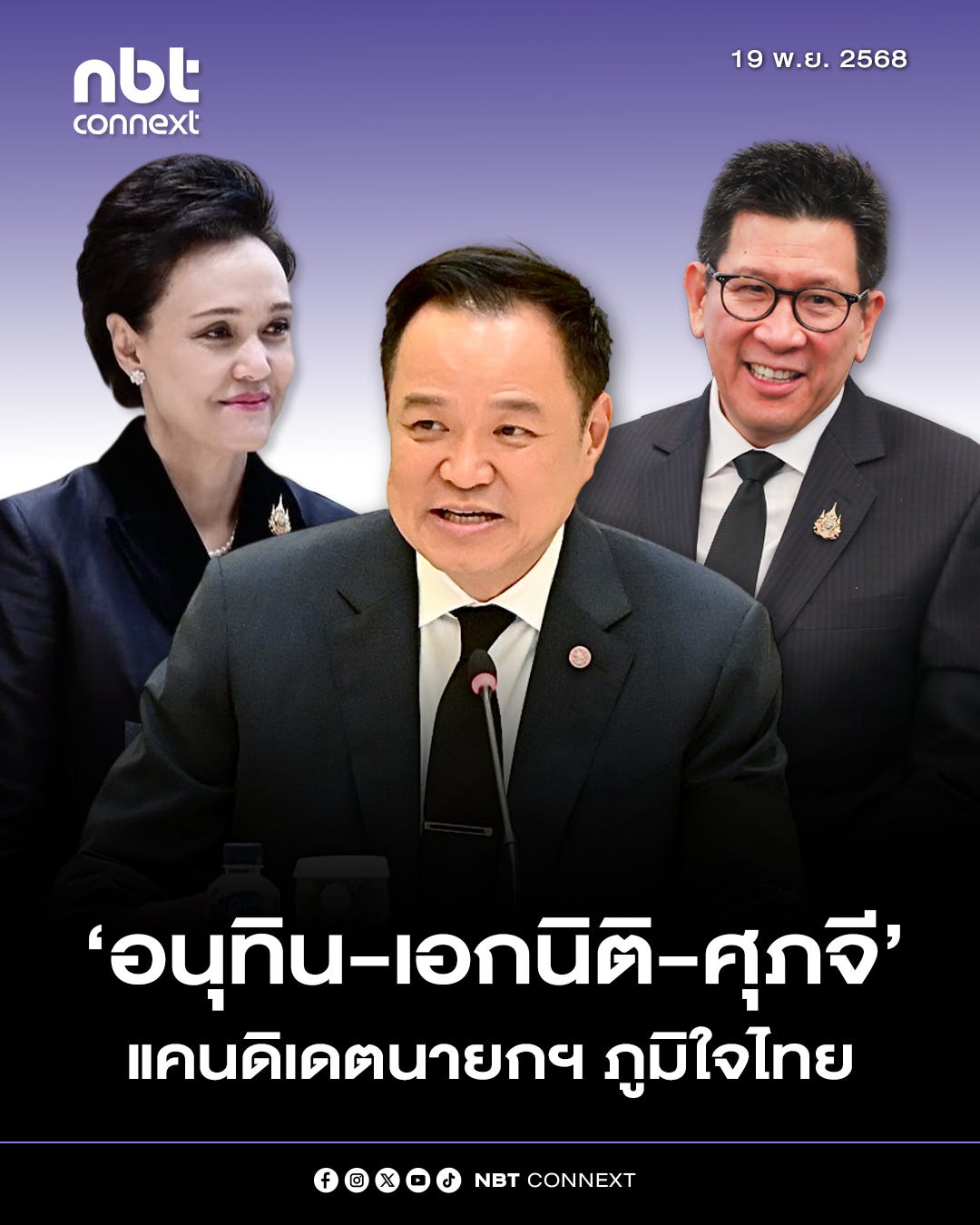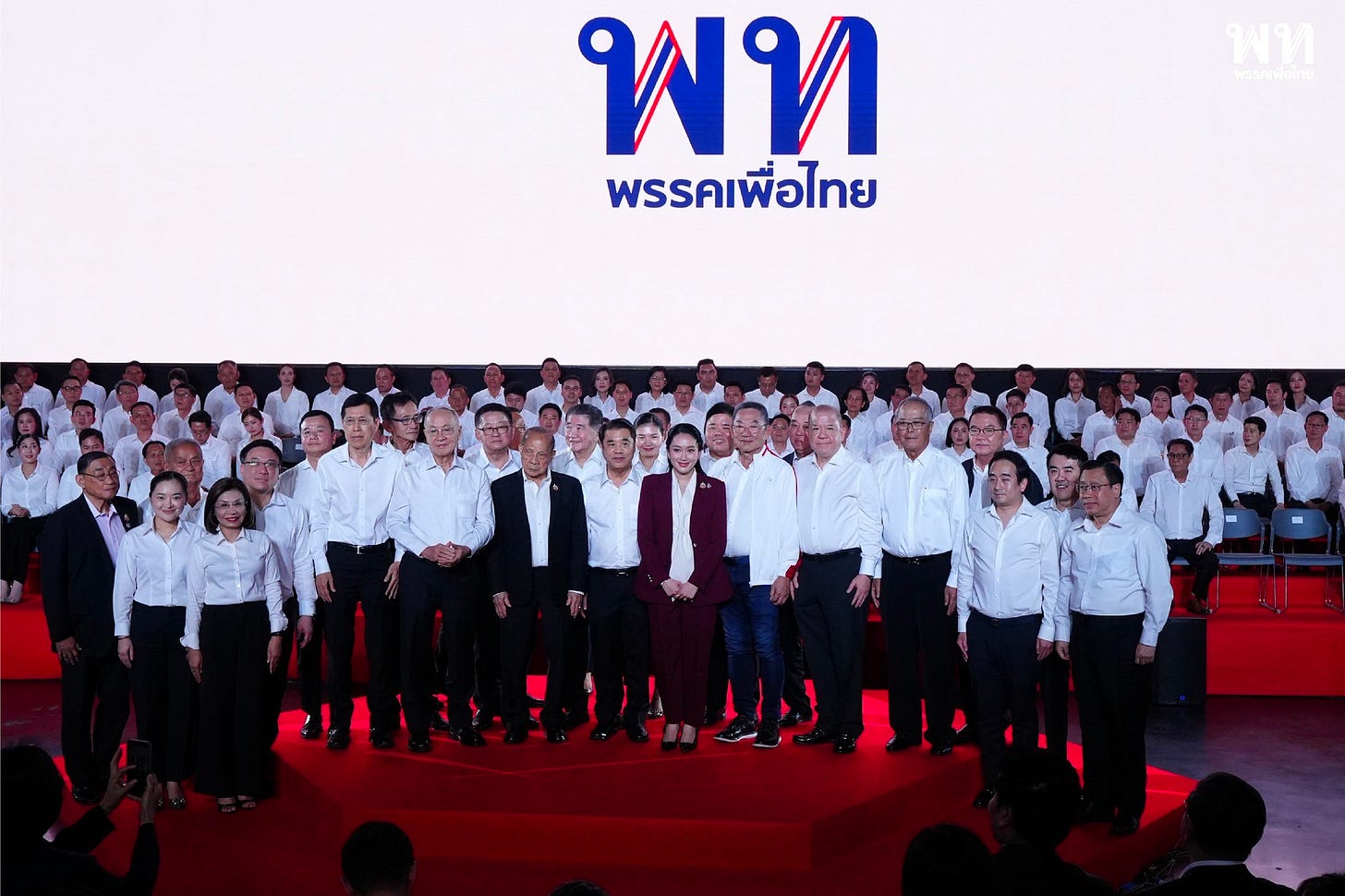Bhumjaithai and Pheu Thai: A Tale of Two Election Strategies
Will the two parties swap places?
It has been an exceptionally busy period in Thai politics. In just the past few weeks, we have seen an overhaul of Pheu Thai’s leadership, several new legal problems surfacing for Thaksin Shinawatra, significant updates on the Cambodian front, and twists and turns in Thailand’s trade negotiations with the United States. So far I’ve resisted doing a “weekly update” roundup of news, because 1) I think there are news agencies that can do a far better job at giving you updates on every event that has occurred, and 2) I prefer to focus on deep dives of a specific topic.
But that inevitably means that in such a busy period, a lot of things are going to fall through the cracks — and unfortunately that will have to be the case when Substacking is not my full time job! I do plan to revisit geopolitics in the coming weeks, but today I’ll focus on some domestic updates. In any event, if you’d like to keep caught up on my Thai political updates, please consider subscribing to The Coffee Parliament.
Yesterday, Prime Minister Anutin Charnvirakul announced that Bhumjaithai will be fielding three candidates for prime minister at the next election. “Bhumjaithai used to be a small party,” he said, and it was sufficient for him to be the sole PM candidate. But now that the party has grown, he feels that it is necessary to bring in more people to assist with the party’s work.
Let’s first take a step back. Thailand’s unique constitutional arrangements limits selection of a prime minister from a list of candidates, and only candidates parties winning 25 or more seats at the general election qualify. Each party can submit three candidates. In the past, many parties did not take advantage of this maximum limit and proposed only their party leader for prime minister. But after the political turmoil of the past three years, where the Move Forward Party found itself candidate-less after Pita Limjaroenrat was disqualified and Pheu Thai found its options increasingly limited after two of its prime ministers were defenestrated, it looks like all major parties will now be keeping their options open by submitting a full slate. It appears likely, for example, that the People’s Party will nominate three candidates, while Democrat leader Abhisit Vejjajiva has confirmed the party will almost certainly nominate more than one candidate.
So it is not surprising that Bhumjaithai will have two other nominees for prime minister aside from Anutin. The choices that Anutin unveiled certainly made a splash, however. Anutin said that Bhumjaithai’s other two candidates will be Deputy Prime Minister and Finance Minister Ekniti Nithithanprapas and Commerce Minister Supajee Suthumpun, two of the “technocratic outsiders” who were brought into Anutin’s “time-limited” cabinet. There had been little indication before yesterday that the two figures — the former having spent his career in the bureaucracy and the latter in the private sector — were interested in the highest level of electoral politics.
Bhumjaithai’s choice is significant for two reasons. Firstly, there were concerns that if Anutin did win the next election, his new majority government would be unable to afford giving so many positions to outside experts — something only possible now because the confidence and supply agreement with the PP means there are relatively few factional demands within the government coalition to satisfy. By nominating Ekniti and Supajee as candidates for the premiership, Anutin appears to be making a firm commitment to include them in some capacity in a future second administration. Secondly, Bhumjaithai is now signaling very strongly that it intends to rebrand the party from a localist, constituency-focused party to one with credible policy expertise that can be trusted in government. This is a major reorientation that demonstrates Bhumjaithai is taking seriously its chances at pulling in voters that have been traditional supporters of other parties.
Ekniti and Supajee are unlikely to ever become prime minister, because they would need to pass two hurdles. Bhumjaithai would first have to be in a position to form a goverment, and Anutin would have to make way for the two. The former is realistic but the second seems far-fetched for now. But this is also a country that has cycled in three years through as many prime ministers. If a political accident does happen to Anutin, the two could indeed find themselves in the premiership.
The strategy that Bhumjaithai is pursuing appears to be quite different from Pheu Thai’s. Last month, Pheu Thai named a new executive committee after the resignation as leader of former prime minister Paetongtarn Shinawatra. Their choice for the party’s new leader is Julapan Amornvivat, son of former leader Somphong Amornvivat. (A Nation report suggested that while many party members had favored Chaturon Chaisang, a former justice minister known for his former activist past.)
The post of Pheu Thai leader is interesting because over the course of most of its existence, it has appeared relatively powerless. Before Paetongtarn, none of its party leaders had ever been nominated to be prime minister,1 serving instead as the party’s parliamentary face in opposition. But the dynamics may have changed with Thaksin Shinawatra in prison, and Paetongtarn returning once again to the role of Pheu Thai “family leader” (a unique position in Thai party politics). So I would be interested to see if the party provides greater latitude to Julapan and actually makes him the face of the party, rebranding it from a Shinawatra-centric party to one that appears more institutionalized.
If recent reports are to be believed, however, Pheu Thai is unlikely to move in that direction. A ThaiPBS report recently noted three likely Pheu Thai candidates for prime minister at the next election. One is Suriya Juangroongrueangkit, who served for a few days as acting prime minister earlier this year. Another potential candidate is Nuttaphong Kunakornwong, the SC Asset CEO who is married to Thaksin’s daughter Pintongta Shinawatra. And the final potential candidate is Yodchanan Wongsawat, a biomedical engineering professor who is the son of former prime minister Somchai Wongsawat and Yaowahpha Wongsawat, Thaksin’s sister.
Both Nuttaphong and Yodchanan have so far not expressed their interest in becoming prime minister. Nuttaphong said that he has not yet given it thought, while Yodchanan earlier this year said that while he would not close the door to politics, for now he wants to focus on academic work. If the ThaiPBS report is accurate, however, it would demonstrate that Pheu Thai is still yet completely unable to move beyond its Shinawatra-oriented brand, nominating members of the family with scarce political experience once again for the country’s leadership.
In a way, Bhumjaithai is evolving to what Pheu Thai (and its predecessor Thai Rak Thai) once was: a party that combines deep local strength with nationally appealing policies and policymakers. Pheu Thai, on the other hand, looks like it could regress to becoming what Bhumjaithai once was: a party that has to rely mostly on its local machines, dominated by the unhelpful image of a leadership clan. Things are still early, of course. I noted just last week that attacking Bhumjaithai where the PP is unwilling does perhaps offer Pheu Thai a path forward. Yet recent moves and latest rumors do not yet show that Pheu Thai is considering a true rebrand like what Bhumjaithai is undergoing.
To be accurate, even Paetongtarn was not serving as party leader when she was campaigning at the 2023 general election to be prime minister.




Chaturon, in fact, led TRT when it was dissolved. He committed the grave sin of trying to separate the party from the Shinawatra family. He even moved its headquarters out of the building that Photchaman had provided.